Top Rankings
Wilson County Schools School District ranks among the top 20% of public school district in North Carolina for:
Category
Attribute
Diversity
Most diverse schools (Top 1%)
Community Size
Largest student body (number of students) (Top 1%)
For the 2025 school year, there are 7 public high schools serving 3,398 students in Wilson County Schools School District. This district's average high testing ranking is 4/10, which is in the bottom 50% of public high schools in North Carolina.
Public High Schools in Wilson County Schools School District have an average math proficiency score of 42% (versus the North Carolina public high school average of 58%), and reading proficiency score of 56% (versus the 58% statewide average).
Public High School in Wilson County School School District have a Graduation Rate of 78%, which is less than the North Carolina average of 85%.
The school with highest graduation rate is Wilson Early College Academy, with ≥90% graduation rate. Read more about public school graduation rate statistics in North Carolina or national school graduation rate statistics.
Minority enrollment is 70% of the student body (majority Black), which is more than the North Carolina public high school average of 55% (majority Black and Hispanic).
Overview
This School District
This State (NC)
# Schools
25 Schools
761 Schools
# Students
10,216 Students
565,764 Students
# Teachers
614 Teachers
33,453 Teachers
Student : Teacher Ratio
17:1
17:1
District Rank
Wilson County Schools School District, which is ranked within the bottom 50% of all 320 school districts in North Carolina (based off of combined math and reading proficiency testing data) for the 2021-2022 school year.
The school district's graduation rate of 79% has increased from 76% over five school years.
Overall District Rank
#175 out of 325 school districts
(Bottom 50%)
(Bottom 50%)
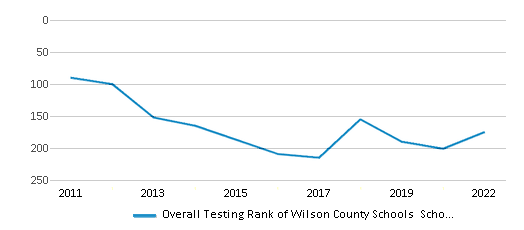
Math Test Scores (% Proficient)
47%
51%
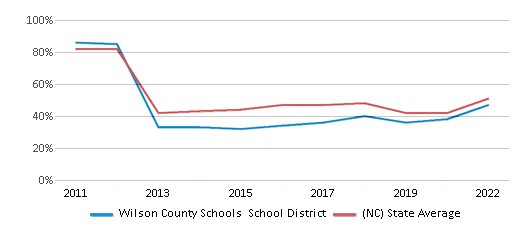
Reading/Language Arts Test Scores (% Proficient)
48%
50%
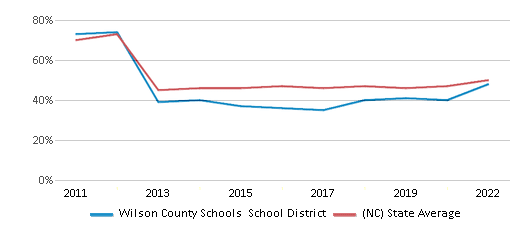
Science Test Scores (% Proficient)
60%
63%
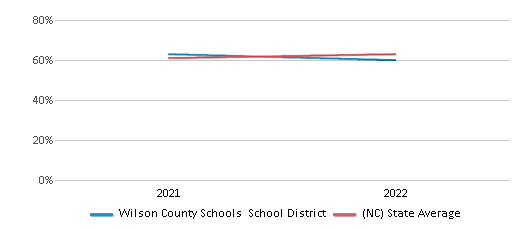
Graduation Rate
79%
86%
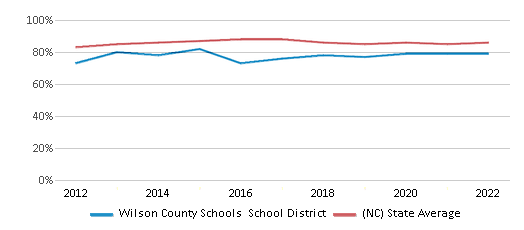
Students by Ethnicity:
Diversity Score
0.69
0.70
# American Indian Students
22 Students
5,772 Students
% American Indian Students
n/a
1%
# Asian Students
151 Students
21,293 Students
% Asian Students
1%
4%
# Hispanic Students
2,468 Students
115,235 Students
% Hispanic Students
24%
20%
# Black Students
4,303 Students
138,700 Students
% Black Students
42%
24%
# White Students
2,834 Students
254,801 Students
% White Students
28%
45%
# Hawaiian Students
12 Students
765 Students
% Hawaiian Students
n/a
n/a
# Two or more races Students
470 Students
30,969 Students
% of Two or more races Students
5%
6%
Students by Grade:
# Students in PK Grade:
137
491
# Students in K Grade:
777
6,922
# Students in 1st Grade:
787
6,949
# Students in 2nd Grade:
841
7,207
# Students in 3rd Grade:
698
7,125
# Students in 4th Grade:
714
7,196
# Students in 5th Grade:
695
7,763
# Students in 6th Grade:
770
11,146
# Students in 7th Grade:
766
12,024
# Students in 8th Grade:
732
12,284
# Students in 9th Grade:
1,030
137,976
# Students in 10th Grade:
847
126,349
# Students in 11th Grade:
771
117,582
# Students in 12th Grade:
651
104,750
# Ungraded Students:
-
-
District Revenue and Spending
The revenue/student of $11,920 is higher than the state median of $11,187. The school district revenue/student has stayed relatively flat over four school years.
The school district's spending/student of $11,236 is less than the state median of $11,612. The school district spending/student has stayed relatively flat over four school years.
Total Revenue
$122 MM
$17,307 MM
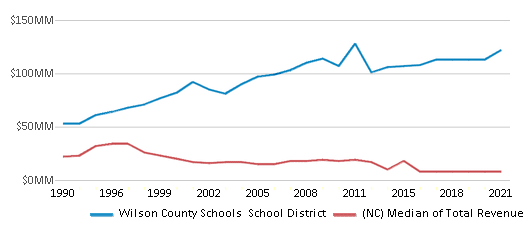
Spending
$115 MM
$17,964 MM
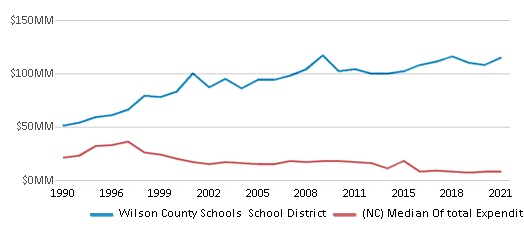
Revenue / Student
$11,920
$11,187
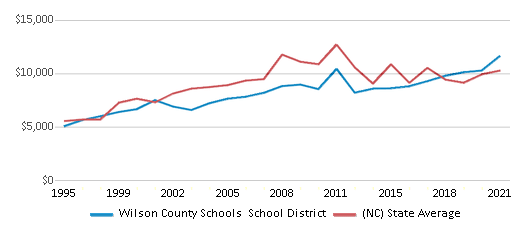
Spending / Student
$11,236
$11,612
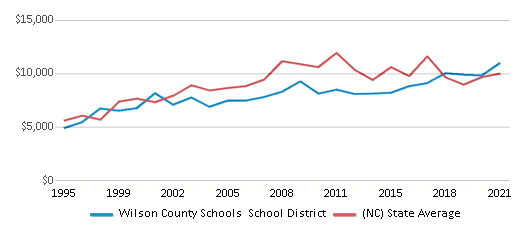
Best Wilson County Schools School District Public High Schools (2025)
School
(Math and Reading Proficiency)
(Math and Reading Proficiency)
Location
Grades
Students
Rank: #11.
Wilson Early College Academy
(Math: ≥90% | Reading: ≥90%)
Rank:
Rank:
10/
Top 1%10
902 Herring St
Wilson, NC 27893
(252) 246-1418
Wilson, NC 27893
(252) 246-1418
Grades: 9-13
| 246 students
Rank: #22.
Wilson Academy Of Applied Technology
(Math: 60-79% | Reading: 80-89%)
Rank:
Rank:
10/
Top 10%10
4809 Ward Blvd
Wilson, NC 27893
(252) 265-4038
Wilson, NC 27893
(252) 265-4038
Grades: 9-13
| 207 students
Rank: #33.
Wilson Academy Of Virtual Education
(Math: 60-69% | Reading: 70-79%)
Rank:
Rank:
9/
Top 20%10
117 Ne Tarboro St
Wilson, NC 27894
(252) 399-7700
Wilson, NC 27894
(252) 399-7700
Grades: 4-12
| 51 students
Rank: #44.
James Hunt High School
(Math: 40-44% | Reading: 68%)
Rank:
Rank:
6/
Top 50%10
4559 Lamm Rd
Wilson, NC 27893
(252) 399-7930
Wilson, NC 27893
(252) 399-7930
Grades: 9-12
| 1,115 students
Rank: #55.
Beddingfield High School
(Math: 50-59% | Reading: 40-44%)
Rank:
Rank:
5/
Bottom 50%10
4510 Old Stantonsburg Rd
Wilson, NC 27893
(252) 399-7880
Wilson, NC 27893
(252) 399-7880
Grades: 9-12
| 683 students
Rank: #66.
Fike High School
(Math: 35-39% | Reading: 54%)
Rank:
Rank:
5/
Bottom 50%10
500 Harrison Dr N
Wilson, NC 27893
(252) 399-7905
Wilson, NC 27893
(252) 399-7905
Grades: 9-12
| 1,023 students
Rank: #77.
Milton M Daniels Learning Center
Alternative School
(Math: ≤5% | Reading: 10-14%)
Rank:
Rank:
1/
Bottom 50%10
723 Elvie Street
Wilson, NC 27893
(252) 399-7900
Wilson, NC 27893
(252) 399-7900
Grades: 3-12
| 73 students
Recent Articles

What Is A Charter School?
Explore the world of charter schools in this comprehensive guide. Learn about their history, how they operate, and the pros and cons of this educational innovation. Discover key facts about charter schools, including admission policies, demographics, and funding, as well as what to look for when considering a charter school for your child.

10 Reasons Why High School Sports Benefit Students
Discover the 10 compelling reasons why high school sports are beneficial for students. This comprehensive article explores how athletics enhance academic performance, foster personal growth, and develop crucial life skills. From improved fitness and time management to leadership development and community representation, learn why participating in high school sports can be a game-changer for students' overall success and well-being.

February 05, 2025
Understanding the U.S. Department of Education: Structure, Impact, and EvolutionWe explore how the Department of Education shapes American education, from its cabinet-level leadership to its impact on millions of students, written for general audiences seeking clarity on this vital institution.





